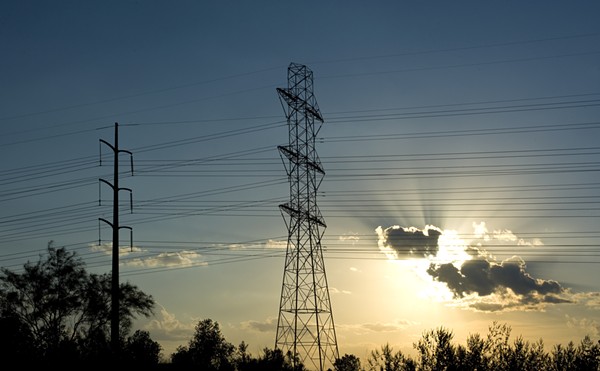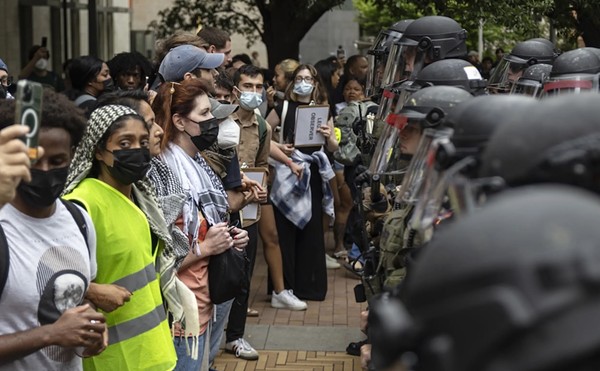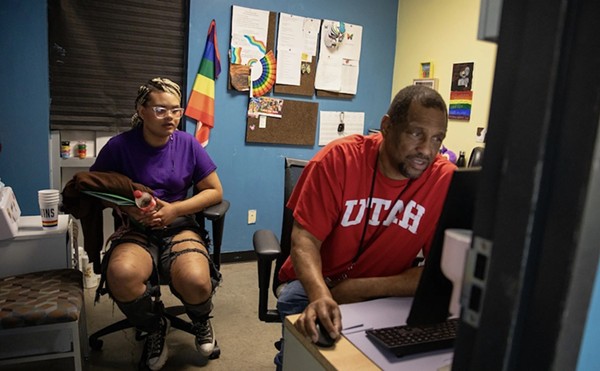CANCúN, Mexico — Imagine you live on an island, a tropical paradise. Turquoise waters rise and fall at the shore’s edge. The ocean’s rhythmic sounds lull you into a sense of security. All feels right in your island home. Then reality hits: You’re a lifelong resident of an island in the Seychelles archipelago in the Indian Ocean and you’re 10 days away from being without drinking water. “The rains should have started. They’ve failed,” says the Seychelles Ambassador to the United Nations, Ronny Jumeau. “It’s never been this bad – it’s climate change that’s compounding it.”
Now travel halfway around the world to Alaska. “Our permafrost is melting,” Patricia Cochran, steering committee chair of the Indigenous Peoples’ Global Summit on Climate Change, tells listeners gathered at the international climate conference in Cancún concluding this week. Arctic homes are falling into the ocean; climatic change is changing the patterns of the caribou, the seals, polar bears — the “supermarkets,” as Cochran refers to the wildlife relied upon by the Arctic’s indigenous communities, are in retreat.
Representatives from 193 world governments are gathered here, charged with negotiating future commitments under the Kyoto Protocol, a pact approved by 37 industrial countries and the European community in 1997 and set to expire in 2012.
And yet expectations are low. The heavily industrialized nations, such as the United States, have proven they lack the will to set carbon-reduction targets that the world’s scientists say are needed to avoid widespread climate chaos.
On the third day of the summit, Japan announced it made no sense to set the second commitment period under the Kyoto Protocol because the current Protocol is imposing obligations “on only a small part of developed countries,” said Japanese negotiator Hideki Minamikawa.
And yet, while a treaty on the reduction of greenhouse gases appears beyond reach again, indigenous communities are pushing hard for measures that could ease, to some degree, suffering caused by the global changes the leading world economies are causing.
Mexican President Felipe Calderón opened the Cancun summit by telling the delegates assembled at the swank Moon Palace that failure to look beyond dominant individual and national interests would be a “tragedy.” He called on negotiators to make progress during the summit’s two weeks with the interests of their children and grandchildren in mind. “Climate change is an issue that affects life on a planetary scale,” he said.
While Japan may have torpedoed any chance of extending the UN process begun in 1992 at the UN Rio de Janeiro Earth Summit, some developing countries are adamantly opposed to dismantling the treaty, insisting that developed nations have an obligation to live up to promises they’ve made to both reduce global warming and find ways to cope with its inevitable changes.
People in developing countries are on the front lines of the impacts of climate change whether they live on islands or in coastal areas, the Arctic, the deserts, urban areas, forests or mountain regions. “The fact that indigenous peoples have survived climate changes which have taken place over thousands of years, and that they continue to survive despite their high vulnerability is a testament to their resilience and their tremendous capacity to adapt,” said Victoria Tauli-Corpuz, chair of the UN Permanent Forum on Indigenous Issues. “However, that capacity is being challenged in the face of accelerating climate change and the grossly iniquitous ways such issues are addressed at global levels.”
Still, it’s expected that a number of issues closer to resolution — forest protection, aid for developing nations, and technology sharing — will make significant progress at this year’s talks. REDD+ (Reducing Emissions from Deforestation and Forest Degradation and Enhancing Carbon Stocks in Developing Countries) is also a hot issue in the negotiations.
Deforestation causes a loss of 13 million hectares of forest per year worldwide and generates some 1.5 gigatons of carbon dioxide, a primary greenhouse gas. The REDD+ scheme proposes to slow climate change by paying developing countries to stop cutting down their forests. Countries and non-governmental organizations (NGOs) have proposed over 30 models of how REDD+ should work.
It would involve a massive transfer of money from rich countries to poor as part of a commitment to decrease the impact of their carbon emissions. Forests would no longer be viewed merely as timber to be harvested or land to be cleared for agriculture.
On December 3, palm oil industry group World Growth launched an attack on REDD+ with a report, “REDD And Conservation: Avoiding The New Road To Serfdom,” that seeks to disprove the scientific community’s consensus that greenhouse emissions from deforestation contribute from 18 to 30 percent of global greenhouse gases. According to their report, the actual figure is 12.9 percent, and could be as low as 6 percent.
Meanwhile, the Board of Consumer Goods Forum, comprised of such global giants as Walmart, Unilever, and General Mills, announced in Cancún their approval of a resolution to achieve net zero deforestation by 2020 in products such as palm oil, soy, beef, and paper. A number of NGOs and academics oppose REDD+ due to fears it would displace and dispossess indigenous communities, intensify the theft of genetic material from the forests, and become a lucrative business for the most polluting companies.
“Market-based mitigation strategies such as the Clean Development Mechanism, and carbon offsets, including forest offsets and REDD+ further threaten our human rights, including our right to free prior and informed consent among many others,” the International Indigenous Peoples Forum on Climate Change said at the opening session. “Our land and territories, food sovereignty, bio-diversity, cultural practices, and traditional life ways are being placed in further jeopardy, and we reject these false solutions.”
The Indigenous Caucus wants all aspects of the work negotiated at the summit done in ways that respect the rights of indigenous peoples in all countries, consistent with the UN Declaration on the Rights of Indigenous Peoples and other international human rights norms and standards. They’ve called for formal mechanisms that ensure full and effective participation by indigenous peoples.
Four alternative climate summits are taking place alongside the official proceedings: a summit of non-governmental organizations; one run by the Mexican government; Klima Forum, first held in Copenhagen in 2009; and La Via Campesina (the International Peasants’ Movement), an organization of over 148 groups that advocates for family-farm-based sustainable agriculture.
La Via Campesina declared December 7 an International Day of Action, with a massive march and protest in Cancún (See “SA climate response,” this page). They’re calling for “thousand of Cancuns” around the world, asking social movements, organizations, and individuals around the world to organize protests and actions during the summit to “reject false solutions and to support a people’s agenda for climate justice.”
Last year’s climate summit produced the Copenhagen Accord, an agreement drawn up by the U.S., China, India, Brazil, and South Africa, which yielded few commitments to keep global greenhouse gasses from rising. It did commit, however, $100 billion a year by 2020 to fund climate protection efforts in developing countries. That action by the five nations angered many of the countries that were excluded from the process, especially poorer nations experiencing the earliest and worst impacts of climatic changes. The Bolivarian Alliance for the Americas, a group of Latin America nations known as the “ALBA countries,” refused to back the Accord.
Many leading climate scientists warn that without any commitment to curtail greenhouse emissions the world is on a path of increasing temperatures to 3.5 degrees Celsius by 2100 and fears of “runaway global warming” leading to massive levels of desertification, famine, and the spread of tropical diseases. Along with the warming comes sea-level rise capable of not only submerging many of the mobilized island states but also of crippling cities like London and New York.
Representatives of the island states and indigenous Arctic communities are adamant that warming should be kept below 2-degree warming. Said Seychelles Ambassador Jumeau: “There is no way we are going to commit suicide to please the others.” •
SA climate response
“A thousand Cancúns” reaches Alamo City
When organizers for indigenous rights at the international climate conference in Cancún put out the call for “a thousand Cancúns” across the globe, San Antonio’s Southwest Workers Union was there. Che Lopez, SWU’s labor organizer, was already riding with the Climate Caravan across Mexico with La Villa Campesina to draw attention to the contribution of indigenous communities and poor farmers already protecting carbon-absorbing lands.
Back in SA, the group’s director, Genardo Rendon, assembled a protest at City Hall, held Tuesday as this paper went to press. Rendon has been active in the climate debate, bringing the message of environmental justice from the World’s Peoples Climate Conference in Bolivia, where a Universal Declaration of the Rights of Mother Earth was crafted after last year’s botched opportunity in Copenhagen. He sat on a panel with progressive humorist Jim Hightower at a recent San Antonio climate forum held by the Texas Drought Project. He shared his thoughts with us on Monday.
On the dangers of REDD
What the indigenous people have been saying consistently is … it’s a predatory program that really pretends to save forests and the climate while really selling out forests from beneath indigenous peoples’ feet. Indigenous peoples for thousands of years have been living in these forests and protecting them.
With REDD, it’s not talking about natural forests, either. So, it could be a plantation of eucalyptus that’s planted. It could be other plantations of trees that are not native to the area, or are damaging. Now the value that’s being put on a tree is only about the carbon dioxide it takes in: not the tree that provides shade, not the tree that’s hundreds of years old, not the tree that’s also part of our ecosystem. Putting a value of carbon reduction on the tree, while that’s okay, it really takes away the natural relationship that exists between ourselves and these plants.
Moving forward, despite political inaction
True change comes with empowering people, one, to believe that they can make it, and also activating them to take some steps of action locally. Here in San Antonio, what I think we need to continue to push is an efficiency and renewable energy platform and program for our city. We need to continue to hold our Congress people accountable here in San Antonio.
What are the alternatives? We’re talking about urban gardens. We’re talking about the city creating a program that allows low-income people to have access to some of these `energy efficient` appliances. It’s not a rebate program. We’re actually pushing a voucher program. We also need to push our schools to push a job-training program in the high schools that allows young people to begin to take advantage of this new economy and start to become entrepreneurs and developers, rather than just the employees that are earning minimum wage.
There needs to be tripling of investment in grassroots organizing in order to have the accountability on our elected officials that then transcends from here up to D.C., not a D.C.-based strategy that filters down to here. — Greg Harman


















